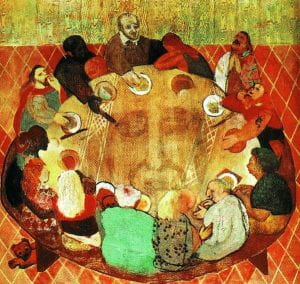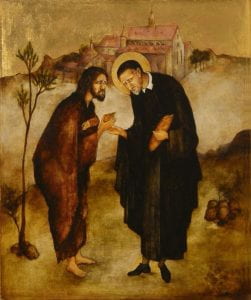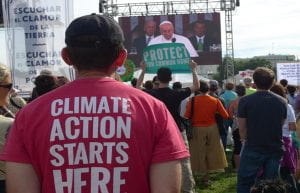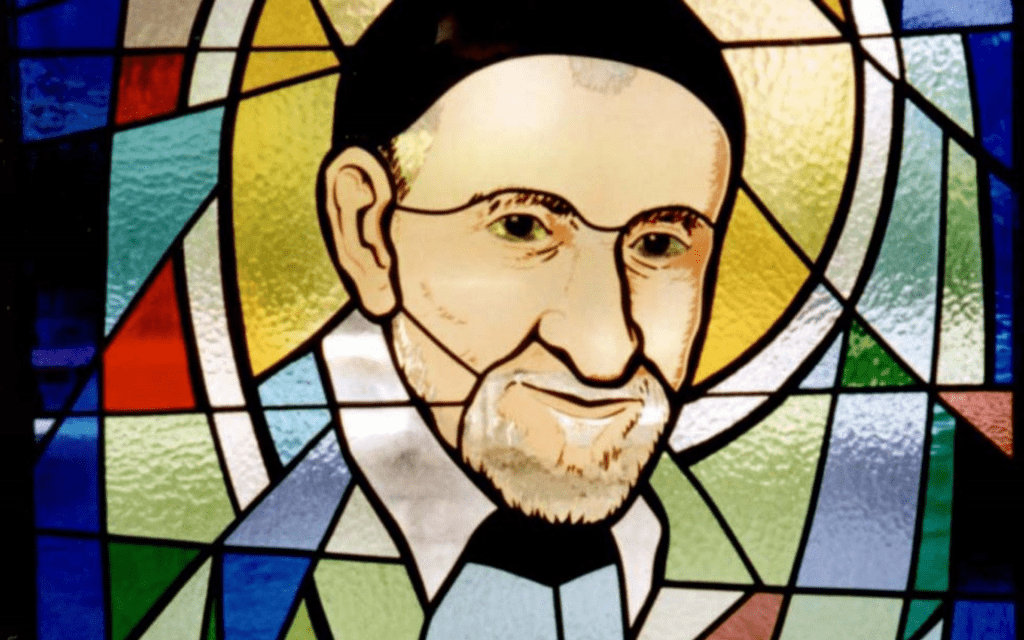
This past Saturday evening, millions of Christians around the world attended the Easter Vigil, the most important liturgy (or religious worship) of the year. With dramatic use of fire and water, prayer and readings, song and silence, the Easter Vigil celebrates the resurrection of Jesus Christ and welcomes new members into the Christian faith. A peak moment that combines these elements during the Vigil is the rite of baptism for adults being initiated into the Church. After months of preparation, those seeking baptism are brought before the assembly. They are invited to renounce sin and profess their faith and then are immersed in the holy waters of baptism, symbolizing cleansing and new life.
Just before this solemn ritual takes place, there is a moment during which the priest leads the worshippers in a unique prayer called the Litany of the Saints. With roots dating back to the founding of Christianity, the Litany of the Saints invokes the aid of those who came before us—angels, saints, and martyrs—to pray for and watch over those of us who are gathered. We are joined with this Communion of Saints through prayer and shared faith. We are in spiritual relationship with them as they give us support and guidance to continue our journeys of faith. The Litany of the Saints is a timeless reminder of our desire for community and connection. It encapsulates the human need for relationships, spiritual and otherwise, that provide care and witness in our lives.
Our need to be in community and relationships, to feel that we are cared for and valued, in good times and in bad, is basic and intrinsic. It is part of what motivates people to join faith communities, as witnessed at the Easter Vigil. Our churches, mosques, synagogues, and other social organizations help meet this need for community. So, too, do our schools, workplaces, and communities. At the most fundamental level, our families and friends are witnesses to our lives whose love and acceptance is enduring, even during periods of struggle and disappointment. As shown throughout human history and within our own personal experience, relationships matter. When healthy relationships abound in our lives, we flourish. When they are lacking, we decline.
This belief in the power of relationships is one that no less a person than the surgeon general of the United States, Dr. Vivek Murthy, endorses. Last year, Murthy issued an advisory calling for all Americans to pay attention to the urgent public health issues of loneliness and isolation that he asserted has reached epidemic levels.[1] In part the result of decades of slowly declining social connectedness as well as the isolating impact of the Covid pandemic, Murthy found that Americans spend more time on the internet and less time with others. They feel less connected with their communities and more alone than ever before. In direct terms, the surgeon general wrote of the importance of rebuilding trust, empathy, and a sense of belonging to help nurture social connections in the face of this growing feeling of isolation.
Despite the vast difference in circumstances between their time and ours, Vincent de Paul and Louise de Marillac understood this basic human need for community and a feeling of connection. At the heart of the service to which Vincent and Louise gave their lives was devotion to those who were abandoned by others,[2] who were the least visible and most marginalized in society. At the same time, in forming faith-based organizations of service such as the Congregation of the Mission and the Daughters of Charity, Vincent and Louise placed great importance on their followers living in community and serving shoulder to shoulder with each other. They saw these community relationships as providing both an edifying[3] as well as practical[4] benefit for the men and women who were the first Vincentian Family members.
Today, DePaul University members are just as in need of relationships and communities as were those early followers of Vincent and Louise. That need is even more apparent as our university community has been subjected to the same forces of changing social norms and the damages of Covid that have caused the broader social disconnect identified by the surgeon general. These realities present DePaul with challenges as great as those our university faces in the areas of enrollment, retention, consolidation, budgeting, and the like.
But, as in most things at DePaul, our strengths and advantages provide us with an abundance of resources needed to overcome these issues. First among our assets is our Vincentian, Catholic mission, which values the human being and the common good above all else. If all parts of the university reflect on how they are best guided to live by our mission, we will have ample protection against the forces that lead to disconnect. In addition, we have a history of being a strong and supportive community whose members have always been grateful to be in relationship with one another and to call DePaul home. Taken together, if today’s generation of talented students, staff, and faculty recognize and agree on the basic challenges that exist to our communities and relationships and then commit to operating within their spheres of influence to make a difference, we will succeed at renewing a vibrant, joy-filled, and supportive community at DePaul.
What might our committed response to these challenges look like? As a first step, it could simply be reaching out to a friend or colleague and scheduling a time to be together. Beyond that, you could join a group or go to an event that might allow you to develop your skills and meet new friends. At higher levels, university resources of money, energy, and attention could go toward supporting opportunities for community and relationship building so that members feel heard, valued, and supported. There are probably many other ways—modest or grand—that our DePaul community can reinvigorate our sense of belonging and connection and put the forces that contribute to loneliness at bay. It gives me, and I hope it gives you, real hope to imagine these possibilities!
Questions for Reflection:
How are you feeling about your relationships and community connections at DePaul? Who are people you can turn to when sharing a joy or a sorrow? Do you fill that role for others? How might you cultivate these relationships if they seem lacking?
Why not commit to doing something to help strengthen the bonds of community at DePaul? Could you reach out to a colleague and schedule a check-in? Attend an event or join an organization? Does anything else come to mind?
The Division of Mission and Ministry’s Faculty and Staff Engagement team would be delighted to visit with faculty and staff at DePaul at any time.
Reflection by: Tom Judge, Assistant Director and Chaplain, Faculty and Staff Engagement, Division of Mission and Ministry
[1] U.S. Department of Health and Human Services, “Our Epidemic of Loneliness and Isolation: The U.S. Surgeon General’s Advisory on the Healing Effects of Social Connection and Community,” 2023, at: https://www.hhs.gov/sites/default/files/surgeon-general-social-connection-advisory.pdf.
[2] Conference 164, “Love for the Poor,” January 1657, CCD 11:349: “Come then, my dear confreres, let us devote ourselves with renewed love to serve persons who are poor, and even to seek out those who are the poorest and most abandoned.” Available at: https://via.library.depaul.edu/vincentian_ebooks/37/.
[3] Conference 1, “Explanation of the Regulations,” July 31, 1634, CCD, 9:2: “What a blessing to be a member of a Community because each individual shares in the good that is done by all!” Available at: https://via.library.depaul.edu/vincentian_ebooks/34/.
[4] Letter 1857, “To Charles Ozenne, Superior, in Warsaw,” April 2, 1655, CCD, 5:349: “The … question is whether you can go alone to visit the sick in the parish. O Jesus, Monsieur, you must be very careful not to go alone! When the Son of God determined that the Apostles should go two by two, He doubtless foresaw the great evils of going alone. Now, who would want to depart from the custom He introduced among His own men and which is that of the Company, which, after His example, acts in this way?” Available at: https://via.library.depaul.edu/vincentian_ebooks/30/.










